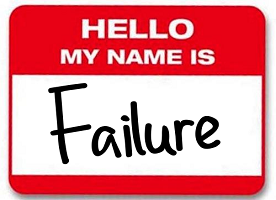How to Recover from an Epic Failure

You know that feeling you get when you suffer an epic fail?
It’s the worst.
I’m not thinking about goofy errors or clumsiness, I’m thinking about those times when we really come up short. We fail at something significant, we make an error in judgment, we let someone down, or we make a really stupid decision.
I’m thinking of those times when we start thinking that we’ll never measure up to the standards that others have set for us, to the standards we’ve set for ourselves.
When those times hit, we can certainly learn from our mistakes, we can double down on good decision-making or better work habits, and we can promise ourselves and others that it will never happen again.
But the feeling in the pit of our stomach won’t be resolved with our good intentions for the future. We must figure out how to let go of what has happened and move past it.
It’s almost like we have to figure out a way to forgive ourselves.
We know from our experience with others that forgiveness is a gift. It can’t be earned or bargained for, it can’t be demanded. It has to be given.
Even if restitution is made, even if we pay for the damage we’ve done, forgiveness is a gift that is something more than this.
Forgiveness is a “letting go” or a “letting be.”
The big idea at the center of the Reformation was that forgiveness from God works the same way. The realization that Luther had was that human beings are reconciled to God by a divine act of forgiveness that cannot be earned. Of his new understanding, Luther wrote, “Here I felt as if I were entirely born again and had entered paradise itself through gates that had been flung open.”1
So, how do we figure out how to give that gift to ourselves?
I think that the answer is – we can’t.
Oh, we talk about buying presents for ourselves and giving ourselves gifts, but we know that these aren’t real gifts – they are purchases we’re making with money we’ve earned (or borrowed). It’s not a gift if you’ve earned it or if you’re going to have to pay it back.
Sometimes, when folks talk about forgiving oneself, what they’re really talking about is not being so hard on one’s self, not expecting perfection when perfection is impossible, and not getting hung up on little errors or disappointments. This is reasonable and good practice. It’s good not to take yourself so seriously that one can’t make any mistakes.
Sometimes, however, things are bigger than that and we feel crushed under the weight of the guilt we feel like we’re carrying around. Forgiveness must be given to us. We can go and talk things over with the person that we’ve wronged if there is someone. We can ask them for the gift of forgiveness – all the time recognizing that we can’t demand this gift. But sometimes there’s no one else. It’s just us and our guilty conscience accusing us.
Pastor Kate and I have a way of doing that for you. We have a script for a ritual of confession and forgiveness that we’d be honored to work through with you. The ritual provides a way of unburdening yourself from whatever has you stuck. It’s a way of coming to terms with whatever has been going on and beginning to move past it. It’s a way to be sure that the gift of forgiveness is even for you. What is said will never be shared or repeated. Pastors make public vows to never share what is told to them in these confessions. (One could also adapt it for use with a trusted friend.)
Pr. Kate and I take turns being available for an hour before Candlelight on Sunday nights and an hour before Celebrate on Wednesday nights. You can also make an appointment with one of us.
I bid you the peace that only forgiveness provides.
Pastor Jim
Oct. 26, 2022
1 Luther’s Works, Vol 34, p.338 Fortress Press, and quoted in Luther, the Reformer by James M. Kittleson, (1989 Leicester: IVP)